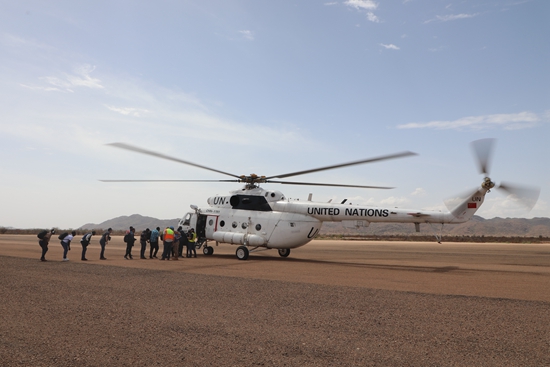
Nineteen stranded UN personnel board the helicopter dispatched by the Chinese peacekeeping contingent in Kadugli, Sudan on May 2.
By Zhao Lingran
The 3rd Chinese Peacekeeping Military Utility Helicopter Unit to United Nations Interim Security Force for Abyei (UNISFA) was assigned by the UNISFA, as the only military helicopter unit there, to evacuate the stranded UN personnel in Sudan and deliver provisions and supplies to those who had to stay on May 1st.
UN civilian personnel, whom the contingent needed to evacuate, were stranded at Kadugli airport for two weeks. At the time, Sudan had closed its airspace. Military airports, including Kadugli airport, have been the focal point of fighting between the two factions. The UN security risk management (SRM) deemed this operation to be of the highest risk level, "Critical". The helicopter might be the target of any attack from the local armed forces, rapid support units, or other armed groups, while having no ground power protection. This posed serious threat to the lives of crew members and passengers.
At around 8:00 on May 2, the helicopter designated for this mission was loaded with ample dry rations and water, body armor, live ammunition clips, first aid kits, backup communication tools, national flags, rules of engagement cards, and photographic evidence-taking equipment. At 9:00, the helicopter took off as planned.
As the helicopter approached Kadugli Airport, the crew noticed that all the anti-aircraft guns around the airport were pointed towards the sky and tracking their movement, as if they were in a heightened state of alert and ready to shoot.
Based on the real-time situation, the crew operated in combat landing mode, and the helicopter kept its engine on after landing at Kadugli Airport. As soon as the door was open, the UN personnel boarded the chopper amidst strong rotor turbulence. Within just four minutes, the crew completed the loading of 19 people and 600 kg of cargo.
At 10:20 am, the helicopter conducted combat take-off and left the Kadugli airport to return.
Meanwhile back in the base, Colonel Liu Xiaodong, commanding officer of the 3rd Chinese Peacekeeping Military Utility Helicopter Unit, monitored the chopper's flight track in real-time. The four minutes the crew spent on standby at Kadugli airport felt like a century for him.
At 11:37, the helicopter landed steadily at Abyei Airport. Peter, an airport guide who walked to the front of the helicopter, gave a thumbs-up and said, "China, excellent! Chinese, awesome!" And inside the cabin, the evacuated UN personnel burst into prolonged applause, expressing their gratitude and admiration.
UNISFA officials including the Chief of Mission Support Robert Kirkwood met the stranded UN personnel at the apron, and expressed their appreciation to the crew members at the same time for their professionalism and bravery.
As a participant and eyewitness of the task, the helicopter pilot Captain Li Ting stated, "It would be lying to say that I wasn't nervous at all, but I am proud. During our flight, I remained highly focused on monitoring the ground situation in order to promptly detect any ground threats, and to be prepared to avoid anti-aircraft artillery and rocket attacks at any moment. Only after the helicopter had safely returned to Abyei and shut down did I finally feel relieved."
After three days of intense flights, the 3rd Chinese Peacekeeping Military Utility Helicopter Unit to UNISFA dispatched 12 consecutive sorties under high-risk operating conditions. They successfully completed the mission by transporting 79 UN personnel from Kadugli, Abu Qussa, and Tishvin in Sudan and delivering 6.5 tons of supplies to the remaining United Nations military personnel in Sudan.













